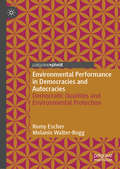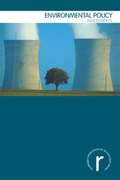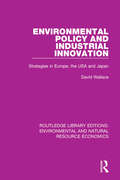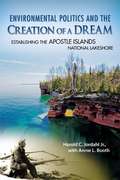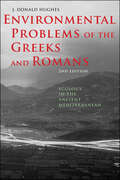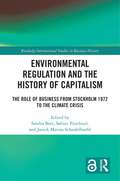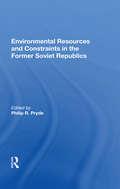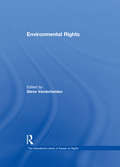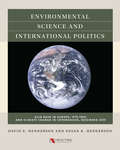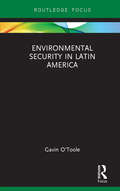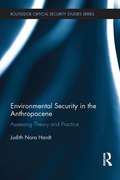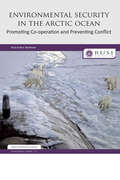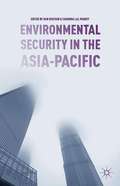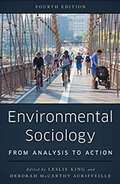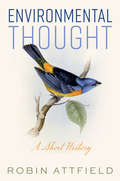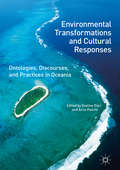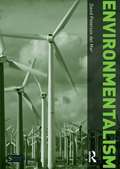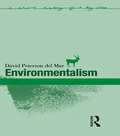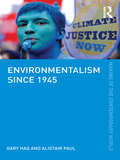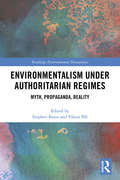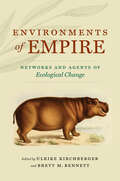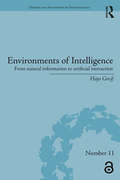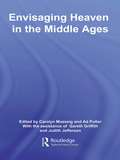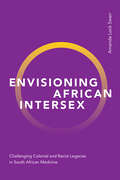- Table View
- List View
Environmental Performance in Democracies and Autocracies: Democratic Qualities and Environmental Protection
by Romy Escher Melanie Walter-RoggThere are considerable differences in environmental performance and outcomes across both democracies and autocracies, but there is little understanding of how levels of democracy and autocracy influence environmental performance. This book examines whether analysing the effects of individual democratic features separately can contribute to a better understanding of cross-national variance in environmental performance. The authors show that levels of social equality in particular, as well as the strength of local and regional democracy, contribute significantly to explaining cross-national variation in environmental performance. On the other hand, a high level of political corruption affects a country’s ability to adopt and implement environmental policies effectively. In exploring the inter-relationship between democratic qualities, political corruption, and environmental performance, this book presents policymakers and political theorists with a clear picture of which aspects of democratic societies are most conducive to producing a better environment.
Environmental Policy (Routledge Introductions to Environment: Environment and Society Texts)
by Jane RobertsWithin the overall context of sustainable development Environmental Policy discusses the opportunities and constraints that environmental systems place upon the operation of human systems. It suggests environmental policy is a potential way to modify the operation of human systems so that they function within environmental constraints. Key social scientific concepts (political, social and economic) are used to explain the background for the formulation and implementation of environmental policy.Environmental problems, the role of humans in creating them, sustainable development and how this concept relates to environmental policy are all introduced. The book then considers environmental policy formulation, implementation and evaluation, within three specific contexts: the firm, the nation state and at the international level. It also reviews the place of economics, science and technology in environmental policy.Detailed case-studies, drawn from a range of international examples, are used throughout to illustrate issues such as global warming, international trade, tourism and the human rights of indigenous peoples. It is well illustrated and includes end of chapter summaries and further reading.
Environmental Policy and Industrial Innovation: Strategies in Europe, the USA and Japan (Routledge Library Editions: Environmental and Natural Resource Economics)
by David WallaceThis book, originally published in 1995, examines the evolution of environmental policy in 6 OECD countries. Through numerous examples, it contrasts the widely-varying political and regulatory styles and their consequences for innovation. Two industry-specific case studies provide a transnational perspective on the co-evolution of technology and environmental policy. The book concludes that innovation can be successfully harnessed by setting credible, long-term environmental goals and ensuring that regulatory instruments are grounded in flexibility, dialogue and trust.
Environmental Politics and the Creation of a Dream
by Harold C. Jordahl Jr. Annie L. BoothThe Apostle Islands National Lakeshore is a breathtakingly beautiful archipelago of twenty-two islands in Lake Superior, just off the tip of northern Wisconsin. For years, the national park has been a favorite destination for tourists and locals alike, but the remarkable story behind its creation is little known. InEnvironmental Politics and the Creation of a Dream, Harold Jordahl, one of the primary advocates for designating the islands as a national park, discloses the full story behind the effort to preserve their natural beauty for posterity. He describes in detail the political and bureaucratic complexities of the national lakeshore campaign, augmented by his own personal recollections and those of such prominent figures as Wisconsin Senator Gaylord Nelson and President John F. Kennedy. Writing in collaboration with Annie Booth, Jordahl recounts how activists, legislators, media, local residents, and other players shaped the islands’ future establishment as a national park.
Environmental Pollution and Community Rebuilding in Modern Japan
by Keiji Fujiyoshi Masafumi Yokemoto Miho Hayashi Mayuko ShimizuThis book describes how modern industry affected people in Japan and their communities by polluting their living environment with toxic emissions. It also shows how the populace endeavored not only to restore their once-clean environment but also to rebuild communities that had been damaged by pollution and its accompanying effects. Environmental pollution is usually referred to in Japan as kogai, public damage, meaning that such pollution not only harms the physical environment—air, water, soil, and the human body—but also destroys the social and personal relationships in the polluted area. Those people who took action recognized that industrial and economic development had been given the highest national priority even at the cost of their health and welfare. In this sense, anti-kogai movements led them to alternative community development and to rethinking what kind of environment and community they wanted. This book also explores the efforts driven by residents in several parts of Japan after the middle of the twentieth century and the endeavors of museums and archives as a memorial to those who suffered from the pollution and for the prospect of a better society with a good environment.
Environmental Problems of the Greeks and Romans: Ecology in the Ancient Mediterranean (Ancient Society and History)
by J. Donald HughesHow did ancient societies change the environment and how do their actions continue to affect us today?In this dramatically revised and expanded second edition of the work entitled Pan’s Travail, J. Donald Hughes examines the environmental history of the classical period and argues that the decline of ancient civilizations resulted in part from their exploitation of the natural world. Focusing on Greece and Rome, as well as areas subject to their influences, Hughes offers a detailed look at the impact of humans and their technologies on the ecology of the Mediterranean basin. Evidence of deforestation in ancient Greece, the remains of Roman aqueducts and mines, and paintings on centuries-old pottery that depict agricultural activities document ancient actions that resulted in detrimental consequences to the environment. Hughes compares the ancient world's environmental problems to other persistent social problems and discusses attitudes toward nature expressed in Greek and Latin literature. In addition to extensive revisions based on the latest research, this new edition includes photographs from Hughes's worldwide excursions, a new chapter on warfare and the environment, and an updated bibliography.
Environmental Regulation and the History of Capitalism: The Role of Business from Stockholm 1972 to the Climate Crisis (Routledge International Studies in Business History)
by Sandra Bott Janick Marina Schaufelbuehl Sabine PitteloudThis edited collection examines the historical role of business actors in climate and environmental governance since the 1970s. Through a compilation of recent, evidence-based historical research, this book unveils the origins of contemporary challenges in regulating environmental pollution. With original case studies, it offers a nuanced understanding of the environmental counter-offensive orchestrated by business leaders, associations, and think tanks post-1972, following the United Nations' pivotal Stockholm Conference on the Human Environment. Readers are presented with insights into the historical maneuvers of business entities aimed at mitigating regulatory risks, co-creating expertise, and framing the environmental debate. From revealing the tactics employed by various business actors to exploring the emergence of market-driven environmentalism, this volume offers a comprehensive exploration of the intricate dynamics shaping environmental policy. By contextualizing specificities and complexities, it enriches contemporary narratives on business influence and power dynamics within global capitalism. This book primarily caters to scholars across diverse historical disciplines, including business history, international relations, environmental history, and the history of capitalism. Additionally, it holds relevance for social scientists studying contemporary issues, policymakers grappling with environmental challenges, and those seeking a deeper understanding of the historical dimensions of climate governance.The Open Access version of this book, available at http://www.taylorfrancis.com, has been made available under a Creative Commons Attribution-Non Commercial-No Derivatives (CC BY-NC-ND) 4.0 license.
Environmental Resources And Constraints In The Former Soviet Republics
by Philip PrydeThe rapid changes in the former Soviet Union have rendered most pre-1992 works on its environment obsolete. A more specifically geographic approach that highlights the particular situation in each republic and region is offered by Philip R. Pryde’s new work, Environmental Resources and Constraints in the Former Soviet Republics. Focusing bro
Environmental Rights (The\international Library Of Essays On Rights Ser.)
by Steve VanderheidenThe essays selected for this volume present critical viewpoints from the debate about the need to establish rights on behalf of greater environmental protection. Three main areas for developing environmental rights are surveyed, including: extensionist theories that link existing rights (for example to subsistence or territory) to threats of harm from exacerbated resource scarcity, pollution or rapid environmental change; proposals for rights to specified environmental goods or services, such as rights to a safe environment and the capacity to assimilate greenhouse gas emissions; and rights that protect the interests of parties not currently recognized as having rights, including nonhuman subjects, natural objects and future generations. This volume captures the potential for and primary challenges to the development of rights as instruments for safeguarding the planet's life-support capacities and features proposals and analyses which argue the need to create an avenue of recourse against ecological degradation, whether on behalf of human or nonhuman right holders.
Environmental Science and International Politics: Acid Rain in Europe, 1979-1989, and Climate Change in Copenhagen, 2009
by David E. Henderson Susan K. HendersonEnvironmental Science and International Politics features two reacting games in one volume, immersing students in the complex process of negotiating international treaties to control environmental pollution. The issues are similar in all the modules; environmental justice, national sovereignty, and the inherent uncertainty of the costs and benefits of pollution control. Students also must understand the basic science of each problem and possible solutions. Acid Rain in Europe, 19779-1989 covers the negotiation of the Long Range Transport Pollution treaty. This was the first ever international pollution control treaty and remains at the forefront of addressing European pollution. This game can be used in a variety of ways and to examine either sulfur dioxide pollution, nitrogen oxide pollution, or both. This game includes summaries of a number of relevant technical articles to support student arguments. Students must deal with the limitations of national resources as they decide how much of their limited money to spend.Climate Change in Copenhagen, 2009 covers the negotiations at the Conference of Parties 15 meeting that was attended by a large number of national leaders. The game also includes representatives of non-government organizations and the press. Students wrestle with the need to work within conflicting limits set by their governments.
Environmental Security in Latin America
by Gavin O'TooleThis book examines security in Latin America through an environmental lens, at a time when this region faces a broad and growing spectrum of threats. The book considers the backdrop against which security debates about Latin America have been conducted; the extent to which scholarship has been dominated by traditional US strategic concerns; and how, in the changing context at the end of the Cold War, some policymakers within Latin America itself at both national and regional levels began to reposition security. It argues that traditional security scholarship focusing on military defence and strategic affairs in this region is hard to explain and out of date, and offers reasons why a new focus on environmental threats within a broader human security perspective has much to offer this field. Such a focus is justified by the scale of the challenges that environmental degradation is posing in Latin America, and the very real impact of climate change there. The book considers how the various theoretical possibilities of the term ‘environmental security’ all have some potential application to this region, where the natural environment is rapidly being securitized by military forces on behalf of their states. Finally, it proposes that a fruitful approach to Latin America might be one where human and environmental security have parity. This book will be of interest to students of environmental security, Latin American security, human geography and IR in general.
Environmental Security in the Anthropocene: Assessing Theory and Practice (Critical Security Series)
by Judith Nora HardtThis book provides a critical assessment of the theories and practice of environmental security in the context of the Anthropocene. The work analyses the intellectual foundations, the evolution and different interpretations, strengths and potential of the link between environment and security, but also its weaknesses, incoherencies and distortions. To do so, it employs a critical environmental security studies analytical framework and uniquely places this analysis within the context of the Anthropocene. Furthermore, the book examines the practice–theory divide, and the political implementation of the environmental security concept in response to global environmental change and in relation to different actors. It pays significant attention to the Environment and Security Initiative (ENVSEC), which is led by different programs of the United Nations, the OSCE and until recently by the North Atlantic Treaty Organization (NATO), among others, and has largely been overlooked in the academic literature to date. The goal is to study how environmental security practice could inform and shape the environmental security theory, and also to explore how, conversely, new theoretical insights could contribute to the enhancement of environmental security activities. This book will be of great interest to students and academic scholars of Environmental Security, Critical Security Studies, Green Political Theory, Global Governance and International Relations in general.
Environmental Security in the Arctic Ocean: Promoting Co-operation and Preventing Conflict (Whitehall Papers)
by Paul Arthur BerkmanThe North Pole is being transformed from a sea-ice cap to a seasonally ice-free sea within the next few decades. This fundamental shift in the boundary conditions of the Arctic Ocean will create a new natural system with different dynamics than anything previously experienced by humans in the region. With the diminishing ice cover, interests are awakening globally to take advantage of extensive energy, shipping, fishing and tourism prospects in the Arctic Ocean. A range of states, including the major Arctic powers, are increasingly asserting their sovereignty seawards. National security policies are being declared and nuclear-capable states are adjusting their strategic deployments in the Arctic Ocean. There are forums for international cooperation in the Arctic, most notably the Arctic Council, but peace in the Arctic Ocean has yet to be explicitly established as a common interest because of the long-standing military presence. Risks of political, economic and cultural instabilities are inherent consequences. This volume proposes environmental security as providing a holistic framework to assess these security risks and then identify the appropriate adaptation and mitigation responses. Only after shared risk assessment and understanding of the appropriate responses, will there be sufficient clarity about the governance paths to pursue within the international legal framework of the law of the sea.
Environmental Security in the Asia-Pacific
by Iain Watson Chandra Lal PandeyEnvironmental security has been one of the greatest threats of the twenty-first century. Crossing the tipping point of two degrees Celsius is projected to be catastrophic, but perennial policy gridlock at the United Nations' multilateral climate change negotiations has so far prevented significant progress. The Asia-Pacific region has much at stake in these negotiations—it is often regarded as the most climate-vulnerable region in the world and also harbors the largest number of poorpeople already affected and in danger of being affected by climate change. Existing climate change literature frames issues through the prism of North-South relations. In contrast, this book focuses on both North-South and South-South relations to reveal an understanding of major climate change and climate change management issues through practices and narratives of environmental security in a specific regional context. The case studies are diverse and represent both large emitters like China and India and the smallest emitter, Nepal, as well as resource-cursed Indonesia, dilemmatic New Zealand, and green visionaries Korea and Japan. Contributors analyze causal interlinkages that affect environmental security policy from both geopolitical and geoeconomic dynamics.
Environmental Sociology: From Analysis to Action (G - Reference, Information and Interdisciplinary Subjects Series)
by Leslie King Deborah McCarthy AuriffeilleEnvironmental Sociology: From Analysis to Action illustrates how sociological perspectives can help us better understand the causes and consequences of environmental problems and provides examples of efforts to ameliorate these problems. <p><p>The fourth edition of this environmental sociology reader includes 22 edited excerpts (10 of them new to this edition) that address, among other things, environmental inequalities, knowledge creation, media, and perspectives on disaster. The selected pieces use a variety of sociological perspectives, including environmental justice, power structure research, ecological modernization, ecological footprint, and more, to examine a wide range of environment-related topics.
Environmental Thought: A Short History
by Robin AttfieldEnvironmental thought has a rich and extensive history. Philosopher Robin Attfield guides readers through the key developments and debates that have defined the field from ancient times to the present. Attfield investigates ancient, medieval and early modern environmental contributions; Darwin and his successors; the debate in America involving Thoreau, Marsh, Muir and Pinchot; the foundation of the science of ecology in the Western world; and twentieth century trailblazers like Aldo Leopold and Rachel Carson. Central themes of key environmentalist works of the 1970s and 1980s are discussed, along with the major debates in environmental philosophy, including Lovelock’s Gaia hypothesis. Attfield then turns to the current environmental emergency, encompassing the crises of climate change, air pollution and biodiversity loss, exploring contemporary intellectual responses to it. Each chapter concludes with a list of recommended readings, selected to invite readers to explore the book’s topics in greater depth. Environmental Thought: A Short History will become a pivotal text in its field, of interest to students and scholars of history, philosophy, ethics, geography, religion, biology and environmental studies.
Environmental Transformations and Cultural Responses
by Eveline Dürr Arno PaschtThis book explores the various ways in which different communities and peoples in Oceania respond to and engage with recent environmental challenges and concurrent socio-political reconfigurations. Based on empirical research, this book discusses topics such as belonging, emotional attachment to land and new forms of environmental knowledge. The theoretical framework of this book is inspired by current debates among diverse conceptualisations of the environment and thus, of various ways of knowing, making sense of and interacting with worlds. With this focus in mind, the book provides new insights in recent socio-cultural and environmental dynamics in the Pacific.
Environmentalism (Seminar Studies)
by David Peterson Del MarWhy are our environmental problems still growing despite a huge increase in global conservation efforts? Peterson del Mar untangles this paradox by showing how prosperity is essential to environmentalism. Industrialization drove people to look for meaning in nature even as they consumed its products more relentlessly. Hence England led the way in both manufacturing and preserving its countryside, and the United States created a matchless set of national parks as it became the world's pre-eminent economic and military power.Environmental movements have produced some impressive results, including cleaner air and the preservation of selected species and places. But agendas that challenged western prosperity and comfort seldom made much progress, and many radical environmentalists have been unabashed utopianists. Environmentalism considers a wide range of conservation and preservation movements and less organized forms of nature loving (from seaside vacations to ecotourism) to argue that these activities have commonly distracted us from the hard work of creating a sustainable and sensible relationship with the environment.
Environmentalism (Short Histories of Big Ideas)
by David Peterson Del MarEnvironmental movements have produced some impressive results, including cleaner air and the preservation of selected species and places. But movements that challenged western prosperity and comfort seldom made much progress, and many radical environmentalists have been unabashed utopianists. In this short guide, Peterson del Mar untangles this paradox by showing how prosperity is essential to environmentalism. Industrialisation made conservation sensible, but also drove people to look for meaning in nature even as they consumed its products more relentlessly. Hence Englandled the way in both manufacturing and preserving its countryside, and the United Statescreated a matchless set of national parks as it became the world's pre-eminent economic and military power. Environmentalismconsiders both the conservation and preservation movements and less organized forms of nature loving (from seaside vacations to ecotourism) to argue that these activities have commonly distracted us from the hard work of creating a sustainable and sensible relationship with the environment.
Environmentalism since 1945 (The Making of the Contemporary World)
by Gary Haq Alistair PaulToday environmental issues are part of daily life, a feature of the modern world almost everyone now recognises. Contemporary environmentalism has promoted a way of speaking and thinking about the environment that was not possible or imaginable decades ago. Environmentalism Since 1945 provides a concise introduction to the greening of politics, science, economics and culture in the post-war period. It covers key issues such as the: birth of the environmental movement development of global environmental governance climate science and the rise of climate scepticism Green New Deal and the call for prosperity without growth greening of mainstream culture and efforts to change attitudes and behaviour challenges the environmental movement will have to address to continue to be a force change. Each chapter provides a historical perspective, anchoring topics to real events, influential ideas, and prominent figures. An essential introduction for all those interested in the history of environmentalism.
Environmentalism under Authoritarian Regimes: Myth, Propaganda, Reality (Routledge Environmental Humanities)
by Viktor Pál Stephen BrainSince the early 2000s, authoritarianism has risen as an increasingly powerful global phenomenon. This shift has not only social and political implications, but also environmental implications: authoritarian leaders seek to recast the relationship between society and the government in every aspect of public life, including environmental policy. When historians of technology or the environment have investigated the environmental consequences of authoritarian regimes, they have frequently argued that authoritarian regimes have been unable to produce positive environmental results or adjust successfully to global structural change, if they have shown any concern for the environment at all. Put another way, the scholarly consensus holds that authoritarian regimes on both the left and the right generally have demonstrated an anti-environmentalist bias, and when opposed by environmentalist social movements, have succeeded in silencing those voices. This book explores the theme of environmental politics and authoritarian regimes on both the right and the left. The authors argue that in instances when environmentalist policies offer the possibility of bolstering a country’s domestic (nationalist) appeal or its international prestige, authoritarian regimes can endorse and have endorsed environmental protective measures. The collection of essays analyzes environmentalist initiatives pursued by authoritarian regimes, and provides explanations for both the successes and failures of such regimes, looking at a range of case studies from a number of countries, including Brazil, China, Poland, and Zimbabwe. The volume contributes to the scholarly debate about the social and political preconditions necessary for effective environmental protection. This book will be of great interest to those studying environmental history and politics, environmental humanities, ecology, and geography.
Environments of Empire: Networks and Agents of Ecological Change (Flows, Migrations, and Exchanges)
by Ulrike Kirchberger and Brett M. BennettThe age of European high imperialism was characterized by the movement of plants and animals on a historically unprecedented scale. The human migrants who colonized territories around the world brought a variety of other species with them, from the crops and livestock they hoped to propagate, to the parasites, invasive plants, and pests they carried unawares, producing a host of unintended consequences that reshaped landscapes around the world. While the majority of histories about the dynamics of these transfers have concentrated on the British Empire, these nine case studies--focused on the Ottoman, French, Dutch, German, and British empires--seek to advance a historical analysis that is comparative, transnational, and interdisciplinary to understand the causes, consequences, and networks of biological exchange and ecological change resulting from imperialism. Contributors: Brett M. Bennett, Semih Celik, Nicole Chalmer, Jodi Frawley, Ulrike Kirchberger, Carey McCormack, Idir Ouahes, Florian Wagner, Samuel Eleazar Wendt, Alexander van Wickeren, Stephanie Zehnle
Environments of Intelligence: From natural information to artificial interaction (History and Philosophy of Technoscience)
by Hajo GreifWhat is the role of the environment, and of the information it provides, in cognition? More specifically, may there be a role for certain artefacts to play in this context? These are questions that motivate "4E" theories of cognition (as being embodied, embedded, extended, enactive). In his take on that family of views, Hajo Greif first defends and refines a concept of information as primarily natural, environmentally embedded in character, which had been eclipsed by information-processing views of cognition. He continues with an inquiry into the cognitive bearing of some artefacts that are sometimes referred to as 'intelligent environments'. Without necessarily having much to do with Artificial Intelligence, such artefacts may ultimately modify our informational environments. With respect to human cognition, the most notable effect of digital computers is not that they might be able, or become able, to think but that they alter the way we perceive, think and act. The Open Access version of this book, available at http://www.tandfebooks.com/doi/view/10.4324/9781315401867, has been made available under a Creative Commons CC-BY licence
Envisaging Heaven in the Middle Ages (Routledge Studies in Medieval Religion and Culture)
by Ad Putter Carolyn MuessigEnvisaging Heaven in the Middle Ages deals with medieval notions of heaven in theological and mystical writings, in visions of the Otherworld, and in medieval art, poetry and music. It considers the influence of such notions in the secular literature of some of the greatest writers of the period including Chrétien de Troyes and Chaucer. The coherence and beauty of these notions make heaven one of the most impressive medieval ‘cathedrals of the mind’. With contributions from experts such as A.C. Spearing, Peter Meredith, Peter Dronke and Robin Kirkpatrick, this collection is essential reading for all those interested in medieval religion and culture.
Envisioning African Intersex: Challenging Colonial and Racist Legacies in South African Medicine
by Amanda Lock SwarrSince the 1600s, travelers, scientists, and doctors have claimed that “hermaphroditism” and intersex are disproportionately common among black South Africans. In Envisioning African Intersex Amanda Lock Swarr debunks this claim by interrogating contemporary intersex medicine and demonstrating its indivisibility from colonial ideologies and scientific racism. Tracing the history of racialized research that underpins medical and scientific premises of gendered bodies, Swarr analyzes decolonial actions by intersex South Africans from the 1990s to the present, centering the work of organizers such as Sally Gross, the first openly intersex activist in Africa and a global pioneer of intersex legislation. Swarr also explores African social media activism that advocates for intersex justice and challenges the mistreatment of South African Olympian Caster Semenya. Throughout, Swarr shows how activists displace doctors’ impositions to fashion self-representation. By unseating colonial visions of gender, intersex South Africans are actively disrupting medical violence, decolonizing gender binaries, and inciting policy changes.All author royalties from Envisioning African Intersex will be donated to Intersex South Africa.
